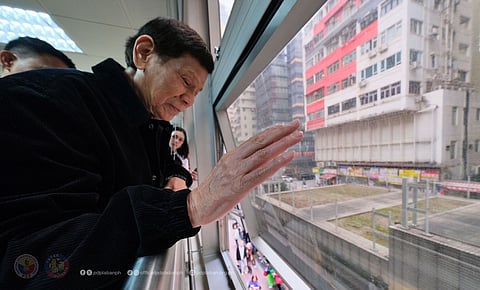
- NEWS
- the EDIT
- COMMENTARY
- BUSINESS
- LIFE
- SHOW
- ACTION
- GLOBAL GOALS
- SNAPS
- DYARYO TIRADA
- MORE

Witnesses in the looming pre-trial of former president Rodrigo Duterte at the International Criminal Court may include law enforcers, such as police, standing as “insiders” to the former leader’s notorious bloody war on drugs, an ICC-accredited lawyer disclosed Tuesday.
Rights lawyer Kristina Conti narrated that this practice is not unusual for the ICC, noting firsthand knowledge of law enforcers regarding the execution of policies and orders from the higher-ups. Conti is not part of the ICC’s prosecution team but is one of the legal counsels of the drug war victims.
“There will be witnesses [to] the incident — either victims or law enforcement agents. At the same time, they could be considered as ‘insider witnesses’ where they could talk about the pattern, instructions, and any actions taken before and after the incident,” she said, partly in Filipino, in an interview.
These law enforcers, she continued, would be required to narrate how the summary killings under the deadly anti-narcotics campaign of the Duterte administration were carried out, confirm whether they acted on orders from the higher-ups, and if they were compensated for doing so.
“We’re expecting a few law enforcement officers. I can’t say if they are in active duty still or retired, resigned, but certainly the ICC has not presented any case without insider witnesses. So we’re pretty sure they have already talked to some,” Conti continued.
In a congressional hearing last year, retired police colonel Royina Garma — Duterte’s alleged trusted aide — confirmed under oath that police were given cash incentives in exchange for killing drug suspects. The monetary rewards, she said, ranged from P20,000 to P1 million, depending on the prominence of the target.
Furthermore, Garma claimed that this payout scheme was modeled after the “Davao template,” allegedly developed during Duterte's tenure as Davao City mayor.
Duterte himself repeatedly admitted before lawmakers that he encouraged police to provoke drug suspects to fight back as a pretext to kill them.
Despite the gravity of his admissions, Duterte insisted that police must be spared from criminal liability, asserting he is solely responsible for the massive killings.
The 80-year-old Duterte has been in ICC custody in The Hague, Netherlands, since his arrest on 11 March in Manila. He faces a single count of crimes against humanity that took place between 1 November 2011 and 16 March 2019, during his tenure as Davao City mayor and as president.
Records from the ICC showed that during that time, Duterte implemented the so-called “common plan” with his co-perpetrators, including members of the Philippine National Police, the Philippine Drug Enforcement Agency, the National Bureau of Investigation, and high-ranking government officials.
The “common plan” refers to Duterte’s policies to eradicate illegal drugs, which allegedly involved systematic killings, torture, and other crimes to eliminate suspected drug offenders.
The government registered over 6,000 drug-related deaths under Duterte’s presidency, though rights watchdogs estimate that the actual death toll could exceed 30,000, most of them from low-income communities.
The prosecution has petitioned the ICC to postpone the deadline for the disclosure of witnesses, initially scheduled for 1 July. They cite the need for protective measures to be in place before revealing their identities and materials.
According to Conti, this would ensure that witnesses are “comfortable” disclosing their identities as well as the content of their testimonies.
Nevertheless, she said that the lawyers representing the drug war victims and the prosecution team are “on track in delivering disclosure of evidence.”
The ICC prosecution team will now be led by Prosecutor Mame Mandiaye Niang, one of the deputies of lead Prosecutor Karim Khan, who went on leave amid an ongoing investigation by the United Nations Office of Internal Oversight Services into allegations of sexual misconduct.
Niang is a Senegalese judge familiar with domestic and international laws, according to Conti, making him “more relevant” to Duterte’s case.
“He is a judge and therefore does not really have a prosecutorial background, but then I would appreciate this from an objective point of view because now he would be focusing on the evidence necessary to reach the threshold for conviction,” she averred.
Niang is likely to represent the prosecution during the confirmation of the charges on 23 September in the event that Khan remains on leave.
